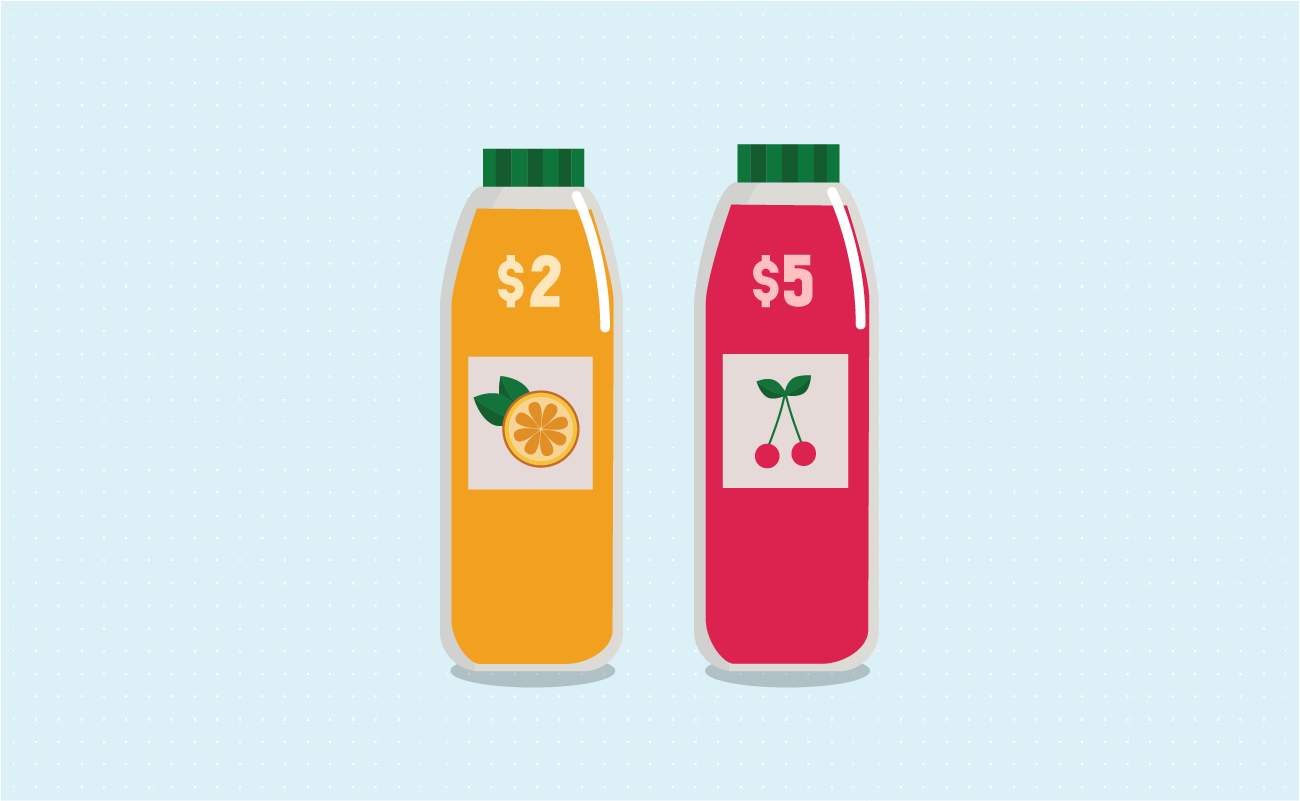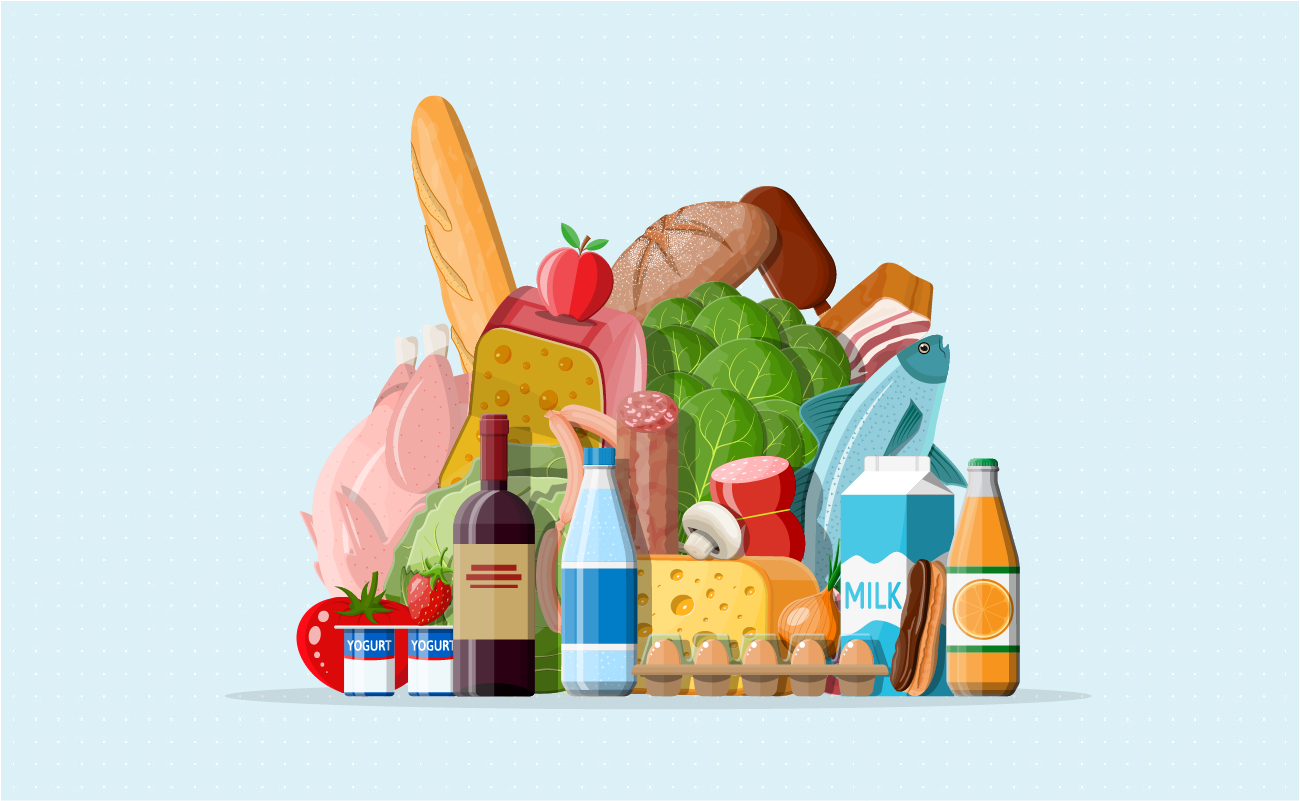 Generic Product Savings Calculator
Generic Product Savings CalculatorBrands create moats which give companies large, sustained profit margins. Consumers who pay premium prices pay for both the added marketing expenses & the increased profit margins. Frugal customers can save a lot by purchasing generic equivalent products. The following calculator estimates the cost savings of buying store brand products along with the compound interest or investment returns on those invested savings.
Guide published by Jose Abuyuan on January 26, 2020

Buying for quality is one of the biggest hallmarks of budgeting. This principle often guides how people buy most consumer goods. Trusting a brand name known for quality makes sense for everyday objects that we use every day. The story is different with comestibles and other groceries.
Often, buyers prefer purchasing branded grocery items. These have a significant markup compared with their generic or store-brand counterparts. They might think that they're getting extra quality from buying a name brand. In truth, they would have paid less for goods of the same quality if they bought generic.
Brand names base most of their appeal from a promise of quality. Thus, more people trust name-brand appliances and other goods. When it comes to items people expect to use a lot, this makes sense. Many brands use their reputation for quality to market their goods. When it comes to items like electronic components and luggage, this makes sense. The brand with the best reputation is the company to keep.
Marketing, however, can overhype an inferior or less-than-satisfactory brand. It is up to the consumer to determine if the quality of the product deserves the hype. A conscientious buyer would counter check this with people's attitudes toward the brand. And for the most part, they are rewarded for their prudence and their faith in trustworthy brands.
There are situations where this approach does not apply. For instance, many products do not vary in quality between brands. Most of these fall under the umbrella of groceries:
These are supplies people buy constantly. You'd think that people would prefer buying them cheap since they're perishable and consumable. Despite this, people are prepared to pay more for these goods than they do on other things they buy.
Branded grocery items often have a significant markup—up to 30 percent in some cases. Although this doesn't seem like much when you're out shopping, it can add up to a significant cost at the checkout line.
People often think that branded groceries must be better than their off-brand counterparts. Thus, they pay the markup anyway. While there are times when a true difference in taste or quality exists, other times this is less clear.
So, why do people insist on purchasing branded over generic groceries?
Branded items create an air of familiarity to their audience. Buyers know these brands through the advertising that bombards them day and night. They gravitate toward brands precisely because they know what they're looking for. When you ask for a chocolate bar, you often have a brand in mind when you look for one.
Grocery brands also use the same advertising promises to customers. They often brag about using better ingredients or processes to up-sell their product. Other times, they rely on the reputation of where they make it. Local products advertise themselves with a patriotic bent. Imported items often rely on the prestige of where they come from. Pasta from Italy relies on the country's culinary reputation. Local pastas, in contrast, wear American-made as a badge of pride.
Brands also create a sense of community and identity. For instance, you might gravitate toward a brand of clothing as a way of fitting into a social group. People buy a certain brand of computer to make themselves look sophisticated or cool. Luxury brands rely on selling an impression of status. A fancy watch may not work any better than a quartz watch, but people want it anyway because they're a status symbol.
Cognitive biases can color a person's judgment of a product, with surprising results. This version of the placebo effect can be amplified by branding. Most people have an ingrained idea that branded products must taste better. Whether there's any truth to the matter is the subject of debate.
The only way to remove placebos is through blind taste tests. Many of these tests reveal that the supposed differences between products are all in our heads. The most noteworthy of these is the infamous wine tasting held in Paris in 1976. In this event, judges ranked American wines from California as high as those from the best wine-making regions in France.
Similar tests reveal that most people cannot tell the difference between branded and generic products. There is a reason for this. Many of these products are made with similar ingredients and would not vary in taste.
Sometimes, though, there is a big difference in quality. Generic products sometimes use different ingredients. Some foods don't taste as good with the presence of fillers. Always read the labels and know what's in your food.
There are items that you are better off purchasing from brand names. These include specialty products like balsamic vinegar, sea salt, or vanilla extract. You must also choose name brands if you are looking for certifications such as organic, kosher, or halal.

Many people assume that the markup of branded items come as a mark of quality. It isn't a stretch to assume they were made to a different standard. This assumption, of course, isn't always true. Often, most generic products carried by supermarkets are made by the same companies in the same facilities as branded items. Thus, the markup doesn't come from the production chain. Instead, it comes from the advertising campaigns used to market the product.
Because generic products don't have similar advertising requirements, they can be sold at lower prices. In these cases, all you paid for with your markup was marketing.
The markup is a lot more pronounced in pharmaceuticals. Much of the costs in making a proprietary drug comes from its development. It can cost a company a fortune to develop an effective pharmaceutical compound.
Thus, companies receive a patent allowing them exclusive rights to manufacture the drug. In this period, they can attempt to recoup the costs and profit from their discoveries. Once the patent expires, any pharmaceutical company can manufacture the drug. Because they don't have the same overhead costs, these drugs are often much cheaper as a result. The price can go down further because of competition from other companies.
That said, generic pharmaceuticals are regulated by the government. This requires them to have the same active compounds as their branded counterparts.

The best generic products on the market are those whose composition does not vary much. Here, you have most conventional ingredients and many processed foods. Despite the name and design on the label, it's all the same on the inside.
Taste is subjective. Sometimes, minute differences between flavors may make you prefer one brand over another. Choosing the generic alternative might not make sense if you don't even buy the product often. In these cases, you might be better off buying branded.
Baking supplies, flours, grains, table salt, pasta, spices, and sugar do not vary much in flavor and composition. They are made and processed in much the same way. There is thus little difference between brands in terms of shelf-life and taste. There won't be any difference between types of all-purpose flour. Table salt will still taste like salt.
Any difference they may have in flavor are often irrelevant once they've been prepared as part of a dish. For this reason, Professional bakers and chefs do not bother with name brands. And neither should you.
The most basic food products—vegetables, fruits, meat, and milk—have little variation between brands. As with dry goods, canned vegetables and fruits are often used in other dishes, where any taste difference is usually negligible. As for certifications, it depends on the retailer. Some grocery chains offer generic produce that is USDA Certified Organic.
Many mistakenly presume that generic medicines are made to a lower standard. In truth, all available medicines in the United States are subject to intense Federal regulation. Thus, there is no difference in the effectiveness between generic and branded medicines. Law requires them to have the same active ingredients, route of administration, and dosage.
The differences are often in the mix of inert materials that carry the medicines. These might affect the medicine's taste or appearance but have no impact on its effectiveness. In fact, studies have revealed that people are more likely to stick with their prescriptions if they took cheaper generic drugs.
Things like aluminum foil and clingfilm rarely have a noticeable difference in quality between brands. Because these items are disposable, quality is often an afterthought.
Choose the branded versions only if you need something more durable or if quality is an issue. You might, for instance, prefer branded toilet paper because it feels better to the touch. Garbage bags that advertise their ability to hold glass shards and wood splinters might be a good choice if you work with a lot of glass or wood. Otherwise, you're buying a level of quality you don't even need.
Laundry detergent and commercial cleaning solutions use the same active ingredients. In most cases, the only differences between branded and generic solutions are cosmetic. The name-brand detergent smells better.
Other times, the concentrations of active ingredients are different. This may affect quality for some applications more than others. Concentrated cleaners might clean floors and toilets better. Brands of bleaches, however, clean socks the same way.

The price of the average American grocery varies between metro areas. People in the Dallas-Fort Worth area spend an average of $286 a month on groceries. In contrast, those in Seattle can pay almost $500 a month.
Going generic is one of the best ways to cut down your grocery costs with minimal effort. It can get you a lot of savings if you choose the right array of products. This also saves income for things you buy in bulk. However, this isn't the only way to save on groceries. Budget-conscious American shoppers have a broad array of options to slash their grocery bills.
Couponing is associated with misers on reality who buy in absurd bulk. Of course, not everyone has the time for extreme coupon cutting. But if you see value in buying in bulk, then couponing might be for you.
Coupons are usually available for branded items. If you collect enough coupons, you might be able to save even more money on branded goods than if you bought generic items.
Farmers and retailers alike waste a lot of acceptable produce to make their products look more appealing. They remove them, even if there isn't anything wrong with the produce. To combat waste and recoup costs, stores sometimes sell ugly-looking fruits and vegetables at a lower price.
By foregoing aesthetics, you can stand to save up to 45 percent of what you would often spend on produce. What more, you also end up curbing food waste. That's more healthy produce on your dinner table and less in a landfill.
Modern stores follow the principles of the Gruen transfer. The aim is to make customers susceptible to impulse purchases. Supermarkets are no exception.
The arrangement of products and aisles are designed to make it difficult for you to buy what you're looking for. Stores place the expensive items closer to eye level. Cheaper items are placed at out-of-the-way corners. Essential items like dairy and dry goods, meanwhile, are placed away from the entrance of the store. Impulse purchases like candy bars are placed close to the checkout counter.
Dollar stores, meanwhile, offer terrible deals compared with larger grocery stores. Their seemingly cheap products are often sold at much smaller volumes. You end up paying a much higher markup for fewer products. Unless you're pressed for time, you are usually better off buying groceries elsewhere.
Get-one specials are also deceptive. Sometimes they can be a good deal at half price. But buying more than three items to get a freebie isn't worth the discount.
Defy the design and psychological tricks. Take your time to read and compare prices. Don't just choose what happens to be in arm's reach. Your budget will thank you for it.
Buying non-perishable necessities in bulk is not always workable. But if your home has enough storage space, this could be a viable option. By purchasing items in bulk when they are on sale, you reduce the need to buy them at retail prices. This can lessen the number of times you go shopping for a specific item. Stop making emergency trips to the dollar store for overpriced items.
Buying generics to cut down on markup prices is a wake-up call for any consumer. It is a reminder to not be swayed by brand names and fancy packaging and to think long and hard about the things we buy.

If a generic item can be just as good as the branded stuff, then maybe other items can be just as good. One of the keys to good budgeting is spending money wisely. Make sure you're getting the quality you want before you pay extra.
Jose Abuyuan is a web content writer, fictionist, and digital artist hailing from Las Piñas City. He is a graduate of Communication and Media Studies at San Beda College Alabang, who took his internship in the weekly news magazine the Philippines Graphic. He has authored works professionally for over a decade.